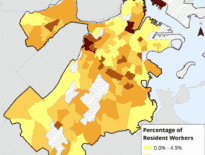Already worried to start the year about the possibility of an economic slowdown, the confidence of Bay State employers in the economy in the midst of the global coronavirus pandemic plummeted in March to near-Great Recession levels as unemployment soared and commerce ground to a halt.
Economic advisers to the state’s largest business trade group predict a recovery is still three to six months away and could be slow.
The timeline for a rebound is also wholly dependent on the ability of public officials to control the spread of COVID-19, and the effectiveness of the social restrictions that have tilted the economy into decline.
“The unprecedented one-month erosion of business confidence represents the unique set of circumstances that have changed almost every aspect of life during the past month,” said Raymond Torto, professor at the Harvard Graduate School of Design and the chair of the board of economic advisers to Associated Industries of Massachusetts.
AIM, which represents about 3,500 employers in Massachusetts, released the results of its newest business confidence survey Tuesday morning, which showed the largest monthly decline in confidence in the economy since the organization began its index in 1991.
Confidence in the economy among many of the largest Massachusetts employers fell 21.9 points to 40.2 on a 100-point scale in March, the first time the marker has moved into pessimistic territory since October 2013.
Pessimism at Great Recession Levels
To put the drop in perspective, AIM said the previous record for a single-month decline was 9.6 points in October 1998. Employer confidence in the economy is just seven points higher than at its lowest point during the Great Recession in February 2009.
“Massachusetts companies are trying to map out their futures in the face of government orders to cease operations and the uncertainty of forces beyond the scope of traditional economic models,” Torto said in a statement.
The release of the March survey results coincides with a virtual gathering of Beacon Hill leaders and experts planned for Tuesday to help lawmakers improve their understanding of how the economic upheaval will influence tax revenues, and therefore the state’s budget for this year and next.
Early estimates suggest the loss of at least a few billion dollars in revenue that the state would otherwise be using to support more than $44 billion a year in spending on payroll, debt, pensions and services like education, health care, food stamps and rental vouchers.
Sales and income taxes could be particularly hard hit as workers have lost their jobs and non-essential businesses shuttered their physical businesses last month.
Unemployment Rate Likely 10 Percent
In Massachusetts, a record 181,062 people filed initial unemployment benefit claims during the week ending March 28, about a 22 percent increase over the prior week. The unemployment rate in Massachusetts had been hovering at 2.8 percent as of January, but is sure to spike.
Northeastern University economist Alan Clayton-Matthews, who will participate in the legislature’s roundtable Tuesday, said the initial unemployment claims filed last week suggest an unemployment rate of 10 percent.
“Even big universities will be hit hard if students can’t or won’t come back to campuses in the fall,” Clayton-Matthews said. “Several sectors such as tourism and travel are likely to lag when the pandemic is over; and the loss of income during the pandemic may keep the economy from ‘bouncing back’ quickly when the pandemic is over – it’s not like there will be a pool of savings supporting pent-up demand like there was after WWII.”
The AIM index is based on a survey of more than 140 employers, and has been conducted monthly since July 1991 based on a scale of zero to 100, with 50 being neutral. The index has twice peaked at 68.5 in 1997 and 1998, and hit its low of 33.3 at the depths of the Great Recession in February 2009.
All the indicators in the survey were down, AIM reported, including a 29.5 point drop in business conditions, an 18.1 point decline in the future index measuring expectations for six months from now and a 12.2 point dip from March in the employment index, as unemployment claims in Massachusetts have skyrocketed in recent weeks.
The employment index, AIM said, has lagged business confidence in recent years because of a “persistent shortage of workers.”
‘Three Months’ to Restart Economy
Edward Pendergast, managing director of Dunn Rush & Co, said that if by June the state can begin to relax some of its “shelter in place” guidelines, then by September the economy might start to rebound.
“It will take at least three more months for the economy to roll,” he said.
Barry Bluestone, a Northeastern University professor of public policy, echoed that timeline, suggesting that much of the money that will flow to consumers and businesses from the $2 trillion relief package passed by Congress will be used for necessities like rent, car payments and necessities like groceries, but very little will be pumped into circulation as long as businesses are closed.
“The slow response by the federal government to the original outbreak is responsible for the length we will have to endure this tragedy. No matter how much it spends now on stimulus cannot make up for that response delay,” Bluestone said in a statement.
Michael Tyler, chief investment officer for Eastern Bank Wealth Management, called the federal relief bill a “crisis-aversion lifeline,” more than a stimulus bill.
The federal aid package made billions in financial support available to small businesses around the country, including loans that could be forgiven by the government if a company can keep its employment levels at pre-virus levels.







